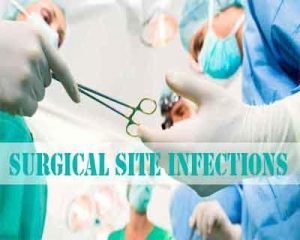- Home
- Editorial
- News
- Practice Guidelines
- Anesthesiology Guidelines
- Cancer Guidelines
- Cardiac Sciences Guidelines
- Critical Care Guidelines
- Dentistry Guidelines
- Dermatology Guidelines
- Diabetes and Endo Guidelines
- Diagnostics Guidelines
- ENT Guidelines
- Featured Practice Guidelines
- Gastroenterology Guidelines
- Geriatrics Guidelines
- Medicine Guidelines
- Nephrology Guidelines
- Neurosciences Guidelines
- Obs and Gynae Guidelines
- Ophthalmology Guidelines
- Orthopaedics Guidelines
- Paediatrics Guidelines
- Psychiatry Guidelines
- Pulmonology Guidelines
- Radiology Guidelines
- Surgery Guidelines
- Urology Guidelines
Prophylactic antibiotics before low-risk operations also prevent surgical site infections

Surgical patients who receive antibiotics before certain types of low-risk operations are not at an increased risk for antibiotic-resistant infections immediately after their procedures, according to results from a large-scale study conducted by researchers from Columbia University Medical Center, New York City. These findings may reassure surgeons who refrain from ordering a short-course of antibiotics prior to patients' surgical procedures because of concerns about breeding antibiotic resistance. Study results appear as an "article in press" on the Journal of the American College of Surgeons website in advance of print.
Surgical, infectious disease, epidemiological, and pharmacy specialty societies have clear guidelines about the use of prophylactic antibiotics to prevent surgical site infections. These guidelines cover major operations of all types, including cardiothoracic, abdominal, head and neck, neurological, obstetric, orthopedic, transplantation, and ophthalmic procedures, and make recommendations about timing, selection, dosing, and duration of antibiotic administration.*
However, the administration of prophylactic antibiotics is left to the discretion of the surgeon before performing other types of operations. "Guidelines don't comment on relatively straightforward procedures, including some general surgical procedures, simple or diagnostic laparoscopy, or elective orthopedic, gynecologic, and urologic procedures because there has not been enough evidence about their benefit. So some surgeons feel strongly that antibiotics are beneficial and always give them. Others never give them because of concern about the use of antibiotics and the later development of antibiotic resistance and bacterial infections that have no or almost no treatment options," said Daniel Freedberg, MD, MS, principal author of the study and a specialist in internal medicine.
Dr. Freedberg and his associates at Columbia University Medical Center assessed the relationship between the use of surgical antibiotic prophylaxis and the development of postoperative antibiotic-resistant infections across a wide range of operations for which there are no specialty society guidelines.
The researchers reviewed all 22,138 patients over the age of 18 who had one of these operations between 2008 and 2016. From this overall population, the investigators selected for study those patients who developed an infection within 30 days of the operation. Patients were included in this study if they had a positive bacterial culture from any surgical site or fluid specimen. The cut-off time was set at 30 days assuming that the effect of antibiotics on resistance would wane over time.
The researchers then determined how many patients with an infection had received prophylactic antibiotics. Their assessment included patients who received any class of antibiotic at any dose, anytime, from one hour before the first surgical incision until the end of the operation.
Patients were considered to have an antibiotic-resistant infection if bacteria isolated in culture were only moderately susceptible or not at all susceptible to treatment within one or more major antibiotic classes.
In this study, a total of 689 patients (3.1 percent) developed an infection within 30 days, and within that group 550 (80 percent) had received antibiotic prophylaxis, and 338 (49 percent) had an infection resistant to antibiotics.
According to study findings, patients had the same risk for developing an antibiotic-resistant infection whether they received prophylactic antibiotics or not. Forty-seven percent of patients with a resistant infection had no antibiotic prophylaxis compared with 49 percent of those who did have prophylaxis.
The risk was the same regardless of other factors: whether antibiotics were given as soon as one hour or as long as four hours before procedures, whether the follow-up period was shortened from 30 to 14 days after procedures, and whether patients had prior exposure to antibiotics or a prior culture-proven infection.
The only factor associated with a higher risk for postoperative antibiotic-resistant infection was a previous antibiotic-resistant infection.
"If you're trying to figure out as a surgeon whether your patients may later develop a resistant infection in the postoperative period, the best clue is past history of resistant infection," Dr. Freedberg explained.
"The results of this study should be reassuring for those surgeons who choose to use antibiotic prophylaxis believing that antibiotics decrease the overall risk for infection following surgery. The study shows that even if patients develop an infection, they will not be worse off because they received a single dose of an antibiotic," concluded Dr. Freedberg.

Disclaimer: This site is primarily intended for healthcare professionals. Any content/information on this website does not replace the advice of medical and/or health professionals and should not be construed as medical/diagnostic advice/endorsement or prescription. Use of this site is subject to our terms of use, privacy policy, advertisement policy. © 2020 Minerva Medical Treatment Pvt Ltd